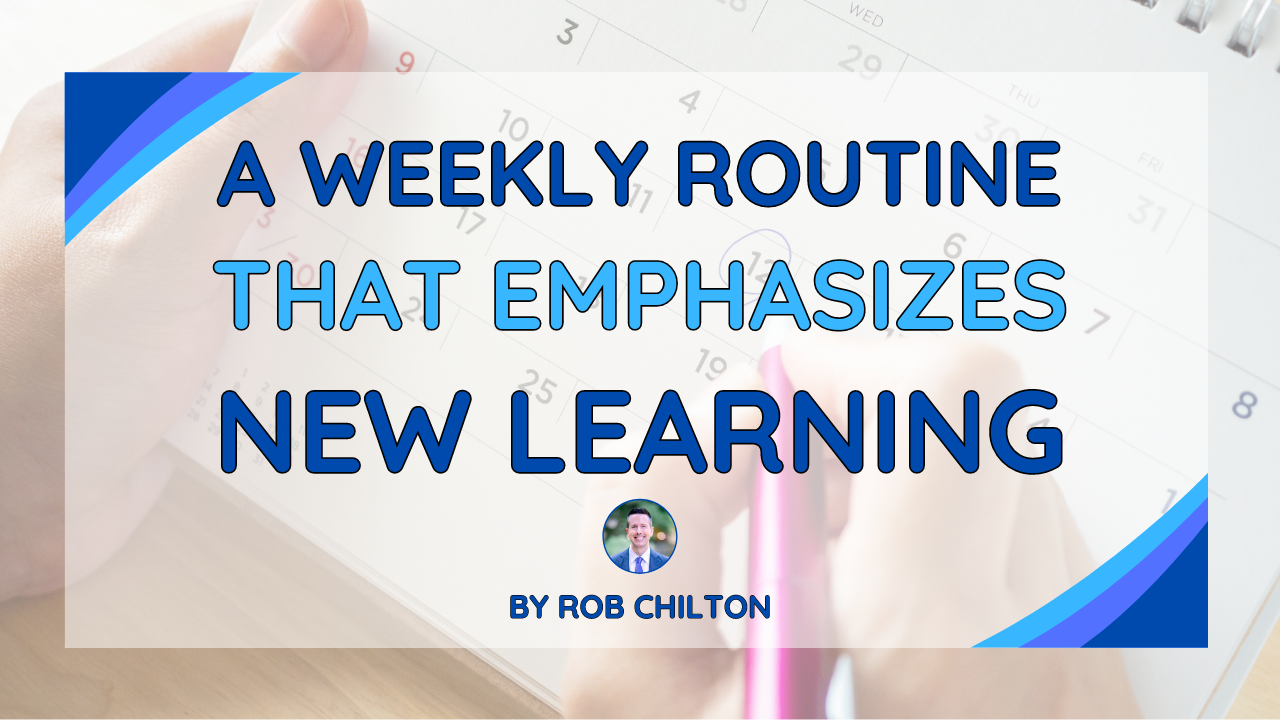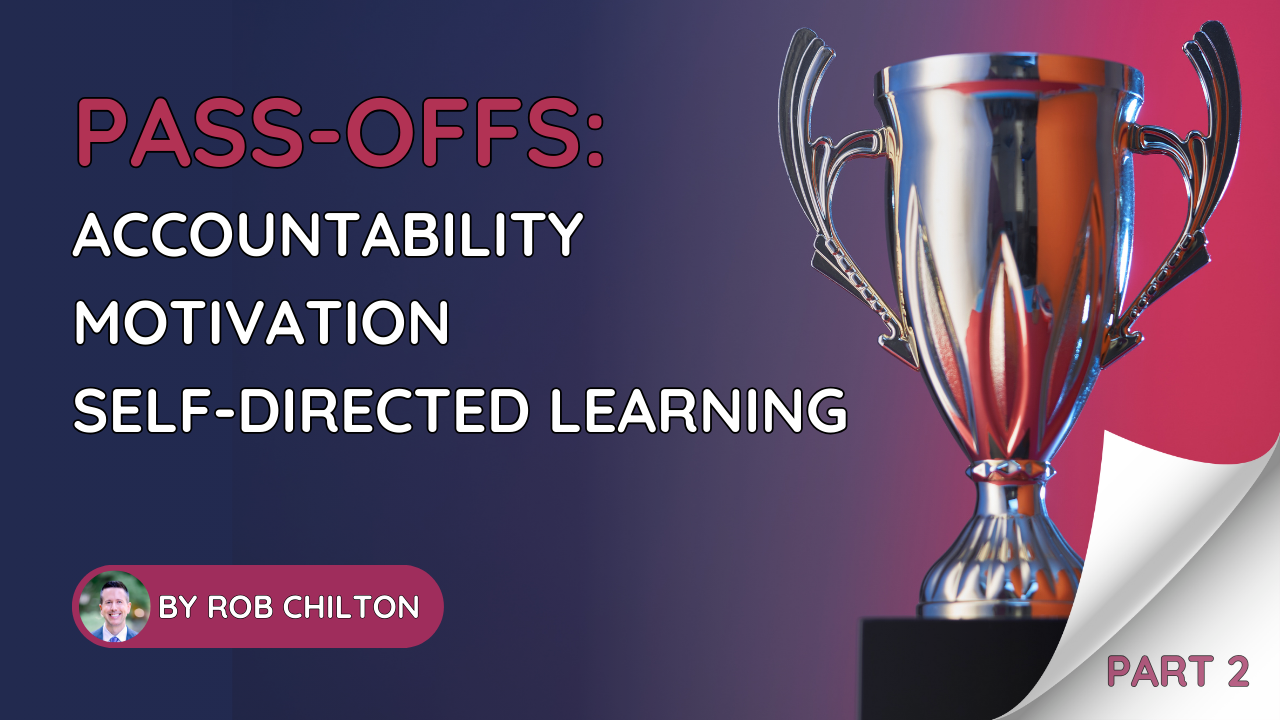Pass-offs: Accountability, Motivation, & Self-Directed Learning
Jun 01, 2024
Estimated Read Time: 5 minutes
By Rob Chilton
In my last article, A Weekly Routine that Emphasizes New Learning, we discussed a weekly routine I used in my beginning band classes:

In case you missed it, you can read the full article by clicking the linked text above or the linked image below:
While that article was geared toward discussing new instruction on Mondays and Tuesdays, I received lots of interest in the pass-offs on Fridays.

So, let’s talk about pass-offs with beginners!
The Pass-off Sheet
Around the sixth week of school, every beginner was given a pass-off sheet with a year’s worth of material. Below is a template which you can download and modify. (The template is a Microsoft Word document that format incorrectly on mobile devices.)
Picking Your Pass-offs
This pass-off sheet has 50 available spaces. We filled 42 of them with lines from the method book, and eight with one-octave scales. We strategically placed the scales at the end of each row—except the first—so students would need to learn new scales to unlock their next achievement. This often led to students learning new scales independently—something they can do when provided the sheet music, a fingering chart, and a little motivation.

Just be careful when choosing material to fill your pass-off sheet. Not everything needs to be a pass-off. In the beginning year, we cover a tremendous amount of material as we take students from square one to ensemble readiness in just 9–10 months. Do we want them to demonstrate mastery of everything we’ve taught? Absolutely. But requiring a pass-off for everything creates an overwhelming workload for everyone—students and teachers alike.

That said, just because something isn’t on the pass-off sheet doesn’t mean you won’t cover it. Continue teaching everything in your curriculum, but be selective about which items you want your students to demonstrate mastery on. We prioritized the method book and scales, but your pass-off selections can include a broad range of content or skills—it’s up to you!
Tip: For material not on the pass-off sheet, use formative assessment strategies—which are continuous, low-stakes checks—such as down-the-rows to see whether students are getting it.
Creating Motivation
In my experience, kids are rarely intrinsically motivated… at first. However, most respond well to external incentives. For our rewards, we issued locker ribbons (similar to karate belts) whenever students completed a row of pass-offs.

These ribbons were a big hit and added lots of flair to our room. They’re homemade and simple to produce. Download the template below and edit the titles to your liking. Then print on colored paper (we used Astrobights Colored Paper), laminate, and cut—it’s that simple!
If you decide to do ribbons, securing them to lockers is straightforward. For lockers like those shown above, wrap the ribbon tightly around four or five bars and secure it on the backside with clear tape (such as Scotch brand). With a little practice, you’ll be putting on these ribbons securely and with ease.
Tip: The neater and tighter you secure these ribbons, the more the kids will value them.
When to Do Pass-offs
As mentioned earlier, we typically did pass-offs in class on Fridays—but there are several other options. Here are a few:
- In-class - This is my favorite option. It requires students to play in front of each other, which is both a necessary and learned skill. I always remind them: We learn to perform for each other first before taking it to the stage. This also lets students hear their peers, and there’s a lot they can learn from both the peer performances and the teacher feedback that follows.
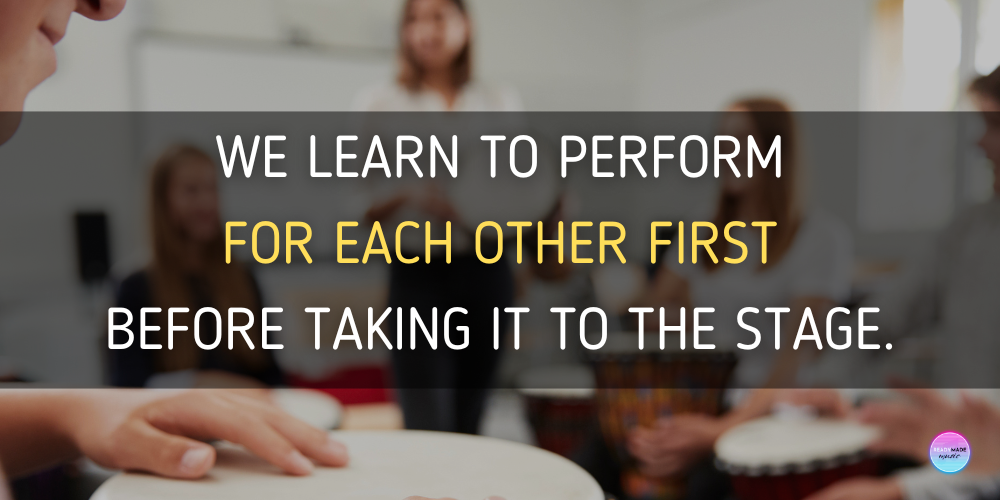
- Before/after school - We regularly offered Friday afternoons as a pass-off time. However, to accommodate more students, you can try offering a morning and afternoon spot. Don’t be discouraged if attendance is low at first—this is common. It will pick-up as time passes, interest increases, and the kids work out their transportation needs. For most, arriving early or staying late takes a little bit of planning.
- Advisory - This is great if your advisory period also doubles as an activity time or study hall. At my last school, we had a thing called “Mustang Time” where students could sign-up to go to a particular classroom or activity. We sometimes used this time for pass-offs.
- Lunch - You can make this work, but I generally advise against it. From experience, it’s easy to overload yourself. And honestly, everyone needs a break and a chance to eat—students and teachers alike.
- Remote via an LMS - This approach can work well. I was once a big proponent of remote pass-offs. Just be cautious—students can easily submit more than you can grade during working hours, and you can easily find yourself spending large chunks of your nights and weekends just trying to keep up with the grading. I know—it happened to me! It’s also harder to provide encouragement and meaningful feedback this way. (And in my experience, when I did leave feedback, it often went unread.)
Music Literacy is the Cheat Code for Self-Directed Learning
Creating self-directed musicians—students who can figure out their pass-off lines on their own—starts with building strong reading skills. Regular music literacy instruction greatly supports this, making pass-offs much easier. We typically scheduled our literacy lessons on Wednesdays or Thursdays.
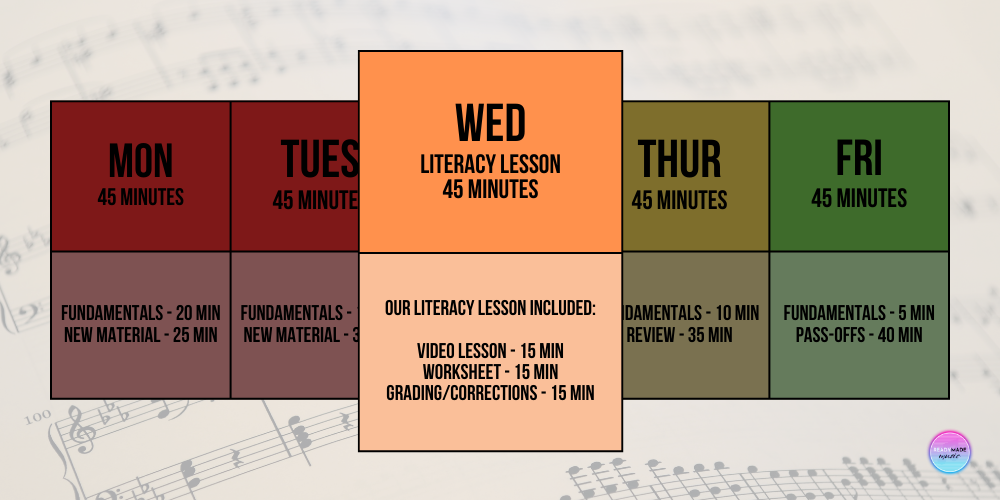
In our weekly literacy lessons, we introduced written musical concepts ahead of the method book. This reduced hurdles in the instructional process and allowed students to progress more independently. The biggest benefit was that our students gained the knowledge and confidence to try learning new material on their own, rather than always relying on us to show them “how it goes.”
Check out music literacy method!
Final Thoughts
Our minimum goal was for every student to pass off one line per week. We encouraged more, but at the very least, we wanted each child to complete one per week so they could regularly experience personal achievement through effort—something many don’t get on a regular basis.
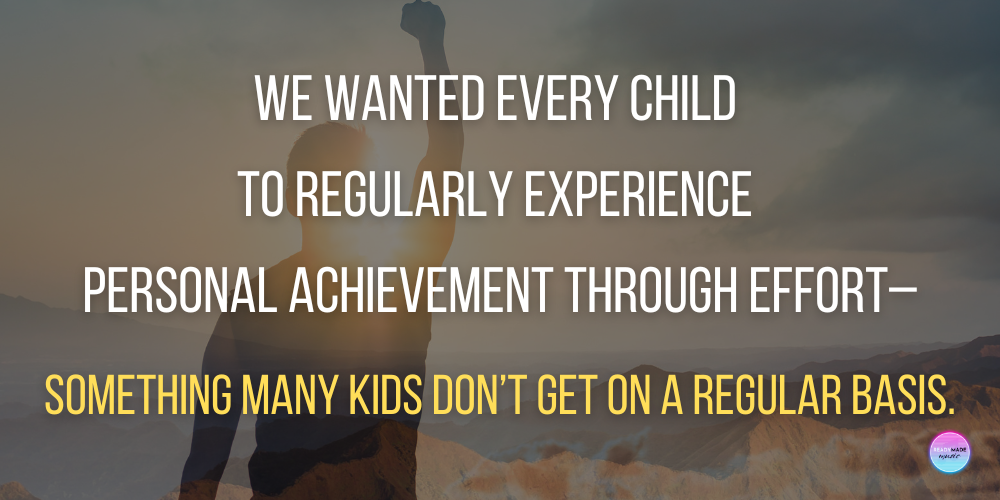
Many students were able to pass-off one line a week—some much more. And there were always some students that would go weeks at a time without passing a line—a problem we’ll discuss how to handle in the future. In the upcoming posts in this series, we’ll discuss:
- How to explain pass-offs to your students
- What rules and procedures they should know
- When to implement pass-offs
- What the first day of pass-offs looks like
- And more!
Stay tuned!
Related Post:
Never miss a new posting!
Check out this short video!
About the author:

Rob Chilton is the creator and owner of Readymade Music, LLC and its content. Previously, Chilton was a middle school band director from 2007-2021. His most recent teaching position was the Head Band Director at Killian Middle School in Lewisville, Texas from 2014-2021.
Under his direction, the Killian Honors Band was named the 2018 Texas Music Educators Association CC Honor Band and performed at the annual 2018 TMEA Clinic/Convention. In 2019, the Killian Honors Band was invited to and performed at The Midwest Clinic in Chicago. Additionally, the Killian Honors Band was named a National Winner in the Mark of Excellence National Wind Band Honors Project in 2015, 2016, 2017, 2018, and 2019.
Chilton is a graduate of Southern Methodist University where he had the opportunity to study music education under the tutelage of Lynne Jackson and Brian Merrill. During his years as a middle school band director, Chilton continued his professional growth under the guidance of his primary clinicians, John Benzer and Brian Merrill.
Chilton’s mission for Readymade Music is to promote the overall well-being of music education and support school music teachers by providing solutions to help make teaching music more efficient and inspirational while increasing engagement for 21st century learners.

© 2024 Readymade Music, LLC
All rights reserved.
The unauthorized distribution and/or reproduction of this work is illegal.

